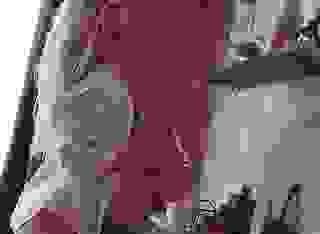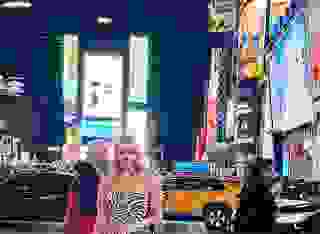- Sci-Fi & Fantasy
- The Future Utopia Ch. 03
Note: You can change font size, font face, and turn on dark mode by clicking the "A" icon tab in the Story Info Box.
You can temporarily switch back to a Classic Literotica® experience during our ongoing public Beta testing. Please consider leaving feedback on issues you experience or suggest improvements.
Click hereChapter 3: That Time I Went to a Low-Key Party in the Future and Talked to People about Life, the City, and Pop Culture Trivia
So, there's no sex in this chapter. Sorry about that. If you're mainly here to get off on the sexy bits (which is totally fine and good), then maybe skip this chapter and come back for the hot and kinky scenes in Chapter 4. But if you want to hear more about how this future utopian city actually works, then by all means come along with me!
As the scene opens, I'm lost in thought, contemplating the nature of individuality and its relation to suffering. (I mentioned I went to grad school, right? You do that a lot there. It's easy to get into the habit.) As a result, I hardly notice as we pass from a smaller courtyard into a large arcade. I'm jolted back into the present world of the future when we spill out into a really massive arena-like place: a round, wide-open area with enough space for a thousand people or more to gather. It's shaded by what seem to be massive trees, but each leaf is the size of a normal tree's entire canopy, and each one is intricately patterned with netlike traceries, like the veins in leaves or the alveoli in lungs. The stalks of these plants, or lungs, or whatever they are, look like flying buttresses the size of redwoods.
There's a big crowd gathered here. I remember the twins saying a lot of people wanted to hear about my life in the 2020s. I felt flattered then, but now I'm absolutely terrified by the thought of giving an impromptu public lecture to a thousand people from the future. I have no clue how much they already know or what they think of our time period. Maybe they hate us for destroying the environment and breaking the world. Actually, that seems very likely to me. My mind goes blank and my palms start to sweat as I try to think about what I'll say to them, given all the terrible things were happening in my time when I left. A number of people seem startled by me, suddenly; there's a ripple in the crowd like a school of fish sensing a predator. People move back to give me space, leaving a ring in the crowd around me. Thankfully, Raine comes over and lays a comforting hand on my shoulder. Sunni does the same on the other side. I explain my stage fright to them.
"Don't worry, you won't have to make a speech." Raine assures me.
"Only a few people will talk to you at any time, just one on one. It's like a...call it a low-key party." Sunni adds.
The touch of their hands on my shoulders feels indescribably good. The tension that had gripped my shoulders seems to melt away.
"Low-key. That's good. We said that a lot in 2021. That and 'vibe.' A nice low-key vibe."
The twins look so absolutely delighted to be using the right period-specific slang that I want to hug them. The euphoric effect of the city laps at me again.
As they promised, I don't have to give a speech. In fact, no one even leads the discussion or hosts the event. The exotic citizens of the future just circulate, in a kind of human Brownian motion, and those who want to talk to me come over and talk. It's like they're all hearing my answers to every question, though, because no one asks the same question twice.
They want to know where I lived, what kind of structure: a house? An apartment building? Or did I live in a "condom," as one charming youth mispronounces, to my amusement and, when I explain, their hilarity. It seems no one in the future has to pay rent or buy property in order to have somewhere to live, and they don't accumulate a lot of stuff they need to store, either. They sleep where they like, and have all they need wherever they are. (I'll show you how this works later on, when I get my own place.)
At about this point, some drinks and snacks show up courtesy of the city: something like a cold sparkling fruit juice (though I can't tell if it's alcoholic over the buzz I've already got from the city) and some crunchy-fried dough strips with a variety of sweet, salty, savoury, and spicy flavours. As we partake, they want to know what I ate in my time. They express some admiration for my attempts to grow tomatoes and herbs and flowers for the pollinators in pots on the patio of my rental house, but show distaste for farmed meat. I gather that everything they eat, whether it seems meat-like or plant-like, is generated without the death of other living things.
They want to know where I went in my life and how I traveled, though they murmur sadly when I describe exhaust-spewing cars, trucks, ships, and airplanes.
They do not want to know much about my degrees or my job. They don't seem to consider work important, beyond whether I enjoyed it or not. They also don't want to hear much about the parts of life that I didn't enjoy, like being overworked, stressed, and isolated during the pandemic, or about what I considered to be the defining economic problems, cultural issues, and natural catastrophes of my time.
"We know that," they say gently whenever I stray into troubling topics. "We learn about those parts of the past so we can make sure they won't happen again. Right now, we want to know about your life, and what you liked about it."
With the city making me feel so good, I find I don't much want to think much about the bad times, either. But I do have lots of questions to ask them back. Relaxed or not, I'm still having trouble believing that this place is a perfect as it looks. So, I try to engage them in some friendly debate.
"This place definitely seems like a utopia," I say, "but every story about supposed utopias I've ever heard of has gone horribly wrong in the end, or it's based in some kind of deception or social control. All this pleasure and indulgence...isn't it just like Brave New World? Do you know that book by Aldous Huxley?"
"We have records of that work, yes," a muscular figure with an enormous cock and equally enormous breasts answers.
"So, you know there's always a catch to utopias. What's the catch here, in this city?"
"The catch?" An elfin albino child pipes up sweetly.
"Well, ok, I haven't read Brave New World since undergrad, but what I remember of it is that the people in this futuristic utopia use a drug called 'soma' to feel good all the time and they have huge orgies, but it's just a kind of social engineering to keep them under control. And the main character, he won't be controlled. He'd rather destroy himself first. So, it's actually a dystopia because it's conformist and it drives free-thinking men to suicide. What about here? What kind of government is there? And what happens to people who disagree with it?"
The twins reappear to answer my questions in language I can understand. I'm grateful for their familiar faces in the swirl of strangers.
"We see what you mean." Raine says. "When you lived, and I guess when Huxley lived too, there was distrust of authority because it was so often misused. There was also distrust of sexual and sensual pleasure because..." the two lean their heads together for a moment, going briefly glassy-eyed, then finish: "...lots of reasons. Religion made pleasure a sin of the flesh. Patriarchy made pleasure a man's right at the expense of others. Capitalism made pleasure a commodity, like in the old saying 'sex sells.' Or so the historians say. Was it really that way?"
"Yeah. There's more, but that was part of it."
"So, that's what shows up in your stories. Distrust of authority. Fear of pleasure. Sex shown as something immoral or something that weakens the will."
"Except if it followed certain patterns, like in a monogamous romantic relationship. Then it can be good." Sunni adds. Raine nods and something else passes between them, a flash of emotion so fast I'm barely sure it's there. The crowd stirs slightly. Then Raine continues,
"You were raised on stories like that, so of course you expect the same patterns to hold here and now. You think that you shouldn't trust the city or accept the pleasure it gives you. You should resist it to the death to maintain your individuality, like this man in the story..." another quick conference passes between them before they finish: "...John."
"I guess that's probably true. That's how a lot of the narratives in my time went, so I feel like this place might be the same way. Even in a movie like The Matrix, it's all one big allegory for getting out of the seductive simulation that controls you with comfort, and getting back into your real body and the real world. The truth is about fighting for your freedom and finding love through suffering. But you're saying it's not actually like that, here in the future?"
"Oh, you can find pleasure through suffering here if you want to. We think you do."
I blush again. This is the second time they've mentioned it. It's like they know me too well already. I'm not ready for that yet. I direct the conversation away deliberately.
"But I still want to know: who's in charge? How's all this happening?"
The twins laugh softly.
"No one is in charge of the whole city. It runs itself. There are people born in this time who want to be in charge of others, naturally. They can find willing partners to dominate here, or they can leave the city to conquer some part of the outside world. There are places outside where leaders set the rules for their loyal followers based on ancient concepts like religion, morality, eugenics, and so on. And there are still places out there where people fight each other for control. The people who fight do it because they believe that's what humanity has always done and that's what they were meant to do, and so they want to keep doing that. Because it's their desire, we don't stop them. But those areas are far away from here, and they don't have the ability to affect the entire world any more."
"Why not?"
"Nuclear rehiscence."
"What's that?"
"Nuclear weapons don't work any more. The splitting or 'dehiscence' of atoms is healed instantly. There are also limits on what other kinds of weapons can be used in wargames outside the city. Nothing is made that can threaten entire cities or populations any more."
"What about other global threats like climate change, then? What about natural resources? Where does all this stuff come from?" With a sweep of my arm I take in the food, the drinks, and the lavishly beautiful city around us.
"Climate change already happened. This is after The Change. The survivors adapted. The resources we have now come from energy to matter conversion."
"Like...Star Trek replicators?"
The twins nod, but before they can explain laughter peals out through the group, and a number of people begin quoting various Star Trek films and shows, some correctly, some not.
"You still like Star Trek in the future." I deadpan.
"Many of your pre-Change fandoms survived the centuries through storytelling. People liked retelling the stories to each other, even when they couldn't watch them any more, and they passed them on to their children. Efforts were made to rediscover and conserve them, just like people in your time who enjoyed and preserved the myths of Ancient Egypt and other cultures. You don't need to believe in their literal truth or follow their values to like ancient stories. We feel the same way about your popular culture. Do you like the show Supernatural?"
"I can't believe I'm here talking to a bunch of future people about Supernatural. Sure, I watched the first four or five seasons with friends in my dorm in undergrad and we all liked it. That's not important, though!"
"But it is important. Weren't you a part of the 'fan culture' in your day?"
"Well, yeah. How did you...you didn't read my fanfiction, did you? Does stuff from the old internet still exist somewhere?"
I start to blush in embarrassment at the very thought. Sunni pats my arm reassuringly.
"No, sorry, most internet content didn't survive The Change, except what was recorded or recreated later. It's just that you keep talking about movies and books from your time. We would love to hear about your fanfiction."
"No, no! That's ok! It really wasn't any good."
They seem ready to insist, but I shake my head. Sidetracked again! These people can't carry on a simple, straightforward conversation.
"Getting back to the authority thing," I say firmly, "if no one's in charge of the city, how does anything get done? Who decides what to do next? Who make sure the city keeps working?"
"The city keeps itself working. Some people work to help the city heal and feed itself because they like to. You grew plants, right? It's sort of like that. The city isn't a machine, it's an organism. We are its stewards and caretakers."
The twins nod together, and many in the crowd also show signs of happy approval. They continue, Raine and Sunni each taking turns speaking as usual.
"In the city, each person decides what to do next and does it. One time, in the early days, it was a popular...meme? Would you say that?...to say we are 'to-gather to-own.' We gather together, to each their own."
"So it's like a direct democracy, where each person has a vote on every issue, with no elected representatives?" I ask.
"Kind of. Only there are no votes or issues. We just move together as a group through each individual's own will."
"But that's impossible, because people, if they have real free will, often have directly opposing, contradictory views about what 'we' should do. Look. Imagine a warlike tribe from the outside was coming to take over the city, and some people here wanted to fight them and some people wanted to run away. What would you do?"
"The city would ask the warlike tribe not to come, and they would turn back."
"Why would they listen to the city?"
"Because they would feel better when the city explained everything. They would have empathy for us, and understand that we don't want to fight."
"And it would work because of this brain chemistry manipulation thing the city does, right? So, it would brainwash them. Just like it brainwashes everyone here into feeling good and agreeing with each other, too."
"What is 'brainwash'?" A black-as-night androgyne from the crowd asked.
"Basically, when people can't think what they want because you make them think what you want."
"Oh. No, we don't do that. They can still think it's good for humans to fight each other. If they want to stay out there and do that, they can. But if they want to come into a city for pleasure, they can. Many do, you know. Everyone knows about the cities. There are hundreds of cities all over the world. Maybe even thousands. Some people leave their 'warlike tribes' and move here, where the city can heal their minds and bodies when they're too broken to fight any more. Some come to stay for a while and then go back when they start to yearn for the strife or structure of their previous home. The city adapts to all kind of people. Very few--a handful in a lifetime--are excreted by the city as truly and irreparably harmful to life here. It's like how your body will excrete a poison that can't be metabolized. But really, we all exist together and know there there's a place in the world for all human drives. As long as they're kept in balance, it's ok. The tribes don't come here to fight us. They come here to relax with us. There are more people--outside and here in the city--who would rather just relax and enjoy life for a while than fight and endure hardship, when they have the choice."
Hmm. I'd like to believe it, but I'm still feeling like that's too easy. Like in the end it could never really work. Or, like someone or something sinister must be behind it all. The twins seem to sense my skepticism and try again to explain.
"Think of it this way. No single bird rules over a seabird colony. No single fish rules over the entire shoal of fish. Each one attends to its needs, and out of their actions, the entire flock flies and the entire shoal swims together. The air and the land and the sea support them in their movements, as we are supported by the city. We move together, each in our own way, in balance with other groups of animals moving in their own ways. And we try to help each other, because we can know each others' needs as if they were our own. We are a balanced..." They conference a moment and then finish "...ecosystem. You are now in the part of that ecosystem devoted to sensual pleasure."
"The mating grounds," I suggest.
"More or less. You don't need to reproduce, though. Unless you want to."
"No thanks!" I blurt out emphatically.
But this gets me thinking again.
"What about population, though? If there's no disease and no crime here, and you're having sex all the time, aren't more people born than die? Where do all the people go?"
"Soylent green is people!" Someone in the crowd calls out. Many laugh.
"That's one of the stories from your time, isn't it?" Raine asks. "Eating fellow humans to reduce the population."
"A Modest Proposal!" Someone else yells out.
"That one's way before my time!" I laugh. "But what's the answer? To the population problem, I mean. Do you really eat people?"
"No, we don't. The simple answer is: births only happen when someone truly desires it, and not that many people want children any more. We don't need very many, so no one is urging people to have them. Children can bring pleasure, but so do a lot of other things. Without social or biological pressure to reproduce, many people choose to pursue other relationships and interests. Those who feel the urge to nurture more often help tend the city."
"The city. Ok, then. Where did the cities come from?"
"They were born from us, from the desires of people like us long ago. I can't tell you exactly how, though. The records from around that time are fragmented because of The Change."
"So there's the big mystery, then! That's what I'm here to find out. Maybe the city is, like, an alien entity that's bioengineering us to create a more peaceful humanity. It could be to keep us from destroying ourselves, or maybe to make us better subjects for the alien overlords who are coming to take over Earth."
"Maybe. We haven't met anyone other than humans so far. If the city was made by aliens, we hope they'll be like the ones in Contexted."
"What's that? I've never heard of it."
"Oh, it came out after your time. But it was a great series. Really groundbreaking. I think you'd like it. We can put it on for you tonight if you want."
A bunch of people in the crowd get excited at the prospect and start quoting lines that make no sense to me. Some wander off, maybe to start watching the show right away. Once again, I feel like the serious issues I'm trying to raise are getting lost in pop culture trivia. Frustrated, I mutter,
"Can't you stay on topic? Or have people totally lost their attention spans in the future?"
"But we've been talking about the same topic this entire time. We're discussing the nature of your world, and of ours. We're trying to help you adjust to this new story so you don't feel like it has to follow one of your old stories. You must have noticed that stories change over time. Now you're in a different time. Why does this story have to be like all the ones you knew before?"
I nod slowly. They're probably right. All the dystopian novels and movies I've consumed over the years might be making it harder for me to accept this world at face value. Maybe they really have discovered a utopia at last. No way to know without trying it out!
"Alright. So, in this new story, what happens? What do I do next? And please don't say 'do whatever you want.' I don't know what my options are, so I don't know what to do yet."
"That's fine! Let's start with exploring the experience of pleasure. It is the basis of life here, but you don't know how to do it yet. At least, not fully. Let us help you with that."








